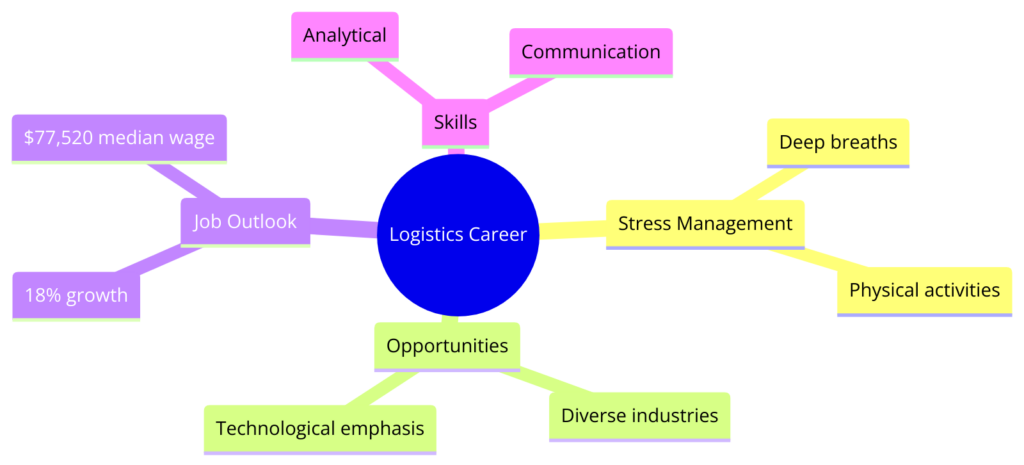The logistics sector is a vital cog in the wheel of global commerce, enabling the movement of goods from one corner of the world to another. However, this critical role comes with its own set of challenges, especially in terms of workplace stress. The very nature of logistics, with its constant flux and the need for precision in timing, places immense pressure on professionals within the field. From ensuring that supply chains remain unbroken to adapting to the rapid shifts in consumer behavior, logistics workers find themselves at the helm of a highly dynamic and often unpredictable environment. This introductory section lays the foundation for a comprehensive exploration into the stressors inherent in logistics careers and offers a guiding hand in navigating these challenges effectively.
Understanding the Stress Factors in Logistics
The world of logistics and supply chain management is fraught with stressors that are unique to the sector. One of the most significant challenges is dealing with the unpredictability of global events—from natural disasters disrupting supply routes to sudden changes in trade policies affecting international relations. These unpredictable elements can throw even the most well-planned logistics operations into disarray, requiring quick thinking and rapid adaptation from logistics professionals.
Another major stress factor in logistics is the pressure of meeting tight deadlines. In an industry where time is literally money, the race against the clock to deliver goods across vast distances adds a constant pressure that can be mentally and physically taxing. This is compounded by labor mismatches, where the demand for skilled logistics workers often exceeds supply. Despite offering higher wages, companies frequently struggle to fill positions, leading to overburdened staff and increased workplace stress.
The rapid evolution of consumer demands also places a strain on logistics professionals. With the rise of e-commerce and the expectation of fast, if not immediate, delivery times, logistics companies are under constant pressure to innovate and improve their operations to meet these expectations. This need for constant evolution and adaptation can be a source of stress, particularly as companies strive to balance efficiency with the growing demands of sustainability and ethical practices.
Moreover, the shift in mindset toward work, exacerbated by the pandemic, has highlighted a disconnect between employers and employees’ perceptions of stress and satisfaction in the workplace. While employers may focus on transactional factors such as compensation, employees are increasingly valuing relational elements like a sense of belonging and supportive team dynamics.
The Psychological Perspective on Workplace Stress
In the fast-paced world of logistics, stress is often seen as a given, but it’s the perspective on stress that can truly make a difference. Psychology teaches us that stress, while inevitably a part of our professional lives, can also be a powerful motivator rather than merely a source of discomfort. This transformative view suggests that stress, when approached correctly, can enhance performance and increase job satisfaction.
Research indicates that how we perceive stress influences its impact on us. Viewing stress as a challenge rather than a threat can lead to better outcomes, both psychologically and physically. This mindset encourages resilience, pushing individuals to rise to the occasion and tackle stress-inducing tasks with increased vigor and determination. By adopting this perspective, logistics professionals can use stress as a springboard for growth and development, turning potential obstacles into opportunities for personal and professional advancement.
Promoting Mental Health and Finding Balance
The logistics sector, with its inherent unpredictability and high demands, requires a proactive approach to mental health and work-life balance. Implementing strategies to manage workplace stress not only supports mental well-being but also enhances overall job performance. Here are some practical steps logistics professionals can take:
- Set Boundaries: In a world where technology keeps us constantly connected, it’s crucial to establish clear boundaries between work and personal life. Decide on specific times when work emails and calls are off-limits to preserve quality time for relaxation and family.
- Prioritize Tasks: With countless demands vying for attention, learning to prioritize tasks based on urgency and importance can alleviate overwhelming feelings. Tackling high-priority tasks first and breaking down projects into smaller steps can make workloads more manageable.
- Practice Mindfulness: Incorporating mindfulness practices into the workday, such as deep breathing exercises or brief meditations, can help center the mind and reduce feelings of stress. Even a few minutes of mindfulness can reset your focus and alleviate tension.
- Stay Organized: A cluttered workspace can contribute to a cluttered mind. Keeping both your physical and digital workspaces organized can help streamline tasks and reduce unnecessary stress caused by disorganization.
- Embrace Healthy Habits: Physical activity, balanced nutrition, and adequate rest are foundational to managing stress effectively. Regular exercise, in particular, has been shown to reduce stress levels and improve mood.
- Seek Support: It’s important to remember that you’re not alone. If stress becomes overwhelming, reach out to colleagues, supervisors, or professional mental health services for support. Collaboration and open communication can lead to more effective stress management solutions.
Simplifying the Complex: The Essence of Logistics Careers

In the fast-evolving world of logistics, professionals navigate a landscape marked by relentless change and high stakes. This sector, essential to the global economy’s heartbeat, demands a blend of skills and resilience from those who venture into its territories. Our exploration distills the essence of logistics careers into four fundamental areas, each a pillar that supports the intricate structure of this dynamic field.
Stress Management: The relentless pace and pressure to meet deadlines can be overwhelming. Effective stress management techniques, such as practicing mindfulness and engaging in regular physical activities, are crucial for maintaining balance and ensuring long-term success in logistics.
Opportunities Galore: Logistics offers a vast array of career opportunities across diverse industries. This richness is further amplified by the sector’s increasing reliance on technology, opening doors to roles that merge traditional logistics functions with cutting-edge tech.
Bright Job Outlook: With an anticipated 18% growth rate through the next decade and a median wage that speaks to its valued contribution, logistics presents a promising horizon for aspiring professionals. This growth is fueled by the continuous expansion of global trade and the ever-increasing complexity of supply chains.
Core Skills for Success: At the heart of logistics are analytical and communication skills. The ability to analyze complex systems and effectively communicate strategies is indispensable. These skills enable logistics professionals to navigate the sector’s challenges and contribute to its evolution.
Incorporating this section into the broader narrative of logistics careers not only highlights the sector’s dynamic nature but also offers a focused lens through which to view the opportunities and challenges it presents.
The Role of Employers in Addressing Stress
Employers play a pivotal role in creating a supportive and healthy work environment, particularly in high-pressure industries like logistics. Recognizing the profound impact of workplace stress on employees’ mental health and overall productivity, employers are increasingly called upon to take proactive measures. Offering comprehensive mental health resources, from counseling services to stress management workshops, is just the start.
More fundamentally, there’s a growing need to reimagine job roles and workplace policies to foster better work-life balance. This could mean reevaluating workloads, offering more flexible working arrangements, and ensuring that employees have the opportunity to voice their concerns and suggestions. A healthy workplace culture is one where stress is not just managed but actively mitigated through thoughtful workplace design and supportive management practices. Creating such an environment not only aids in retaining talent but also in attracting new employees by showcasing the company’s commitment to their well-being.
Emerging Trends and Their Impact on Stress
The logistics sector is not static; it is continuously shaped by emerging trends that redefine how work is done, which in turn influences workplace stress. Automation, for example, offers the promise of efficiency but also raises concerns about job security and the need for new skills. Similarly, the gig economy has introduced flexibility in working hours and locations, yet it can also lead to uncertainty and a lack of stable income for some.
These developments necessitate a fresh approach to managing workplace stress. It’s crucial for both employers and employees to stay informed about these trends and understand their implications. For instance, embracing automation could free up employees from repetitive tasks, allowing them to focus on more engaging and meaningful work, potentially reducing stress. On the other hand, the gig economy model might require more robust support systems to ensure that workers don’t feel isolated or undervalued. By recognizing and adapting to these trends, the logistics sector can mitigate new sources of stress and harness opportunities for a more dynamic and fulfilling work environment.
Conclusion: Navigating Your Path to Success in Logistics
Navigating stress in logistics careers is a journey that requires resilience, support, and a proactive approach to workplace well-being. Employers and employees alike have a part to play in creating a work environment that not only addresses the challenges of today but is also prepared for the trends of tomorrow. As the logistics sector continues to evolve, driven by technological advancements and changing market demands, embracing innovation and prioritizing sustainability are key. By fostering a culture that values mental health, promotes work-life balance, and encourages continuous learning and adaptation, logistics professionals can thrive, achieving success in their careers while maintaining their well-being.

